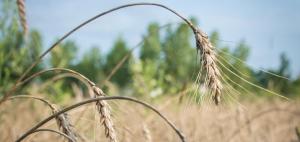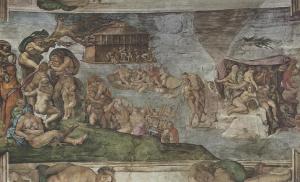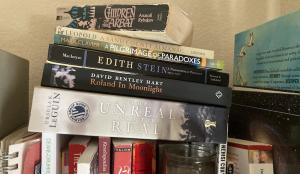
“At Plainsong Farm, God is remaking Christianity. And we get to be part of that.” -Nurya Love Parish
This past week, Seminary of the Southwest had a visit from a remarkable human being. Nurya Love Parish is a priest whose ministry consists in farming. She heads a team of five people, along with a host of volunteers, whose Plainsong Farm in Michigan is a ministry of the Episcopal Church. Our students invited her to come for an annual endowed lecture. They asked me, in light of my ecotheology research and teaching, to lead the Q&A.
Christian Agrarianism
Plainsong is part of a movement sometimes called Christian Agrarianism. Members of this movement attempt to bring faith directly into relation with soil. With how they eat from it, tend it, and belong to it. I’ve written about agrarianism in this column earlier.
You can read the Plainsong story on their fantastic website. If you do, you’ll notice the humility and honesty of Rev. Parish as she describes her “small experiment.” That’s my seminary’s adopted language for the non-grandiose way we get to cooperate with God’s work. Maybe salvation, as my colleague Nathan once put it, is “no bigger woop” than flexible practices in which we adjust our own actions to the work God is already up to.
Admittedly, “What if we bought a farm?” doesn’t sound like a small experiment. Parish says she and her husband were the sort of young adults who read Wendell Berry and then thought, “why not?”
Personal note: there but for the grace of God go I. I didn’t read Berry, the Kentucky poet, prophet, theologian, and farmer, back in my 20s, when my Aunt Glenda told me to. I was too busy with Kierkegaard. And after reading Kierkegaard, I thought, “why couldn’t I be a philosophically minded theologian who writes and teaches about the strange new world of Christian faith?” Now every time I read Berry I hear a voice in my head saying, “If I were in my 20s, I’d go be a farmer and walk the fields and fence rows reciting these poems.”
Small Experiments in Salvation
No, her step was not small. A major leap of faith (Kierkegaard again? I clearly overfed on him). But in Parish’s description, it was a series of small steps, and of some large failures that led to new experiments. What if we prayed for our soil? If we invited neighbors to “Sabbath on the Farm?” What if we sowed heirloom wheat for our communion bread?
Parish’s faith draws on what Catholics and Wesleyans call “prevenient grace.” God’s Spirit works in us “ahead of time,” opening us up to want what God has been wanting all along.
But small experiments, when the crisis is overwhelming? As if voicing the worry in our heads, she suggested that “what can I do about it?” is not the question of a Christian disciple. The disciple asks, rather, “how is the place where I am standing a place where God can work?” That’s the logic of the gospel. In all those small steps on a Michigan farm, she told us, “God is remaking Christianity. And we get to be part of that.”
Still in Eden
The real gift of Rev. Parish’s lecture, for me—and this will be a major shock I’m sure—is the way she lead us into the theological vision that enfolds the farm.
The history of Christianity in the modern west, she said, is a history of falling to the temptation of grasping for everything. Of showing no wisdom or restraint. “We’re still in Eden,” is the way she put it, “showing no more restraint than Adam and Eve did.” The Doctrine of Discovery, Manifest Destiny: these are some of the favorite American ways of leaning into original sin.
She walked us through the temptation narratives, and invited us to notice the way Jesus’ wisdom retells the story of Eden, but in reverse. He ungrasps the fruit of the forbidden tree. We live not by the bread we can grasp, but by the words that come from God’s mouth. In Christ, God is speaking a new language. And we get to learn the dialect.
The Big Woop of Resurrection
That remaking that Christ exhibits goes all the way to his remaking of death at the cross and tomb. The deep sense that the work of farming is the work of salvation comes from Rev. Parish’s trust in the power of resurrection. “All things hold together in Christ,” she reminded us, quoting Colossians. That means that the Eden story which we continue to tell—more harvest! More prophet! More land!—is not our true story. Matthew 4 is our true story. And the final undoing of death in the supernatural gift of life? That’s how earth’s true story ends.
To be a disciple of Christ is to share—through the big woop of small experiments—in the power of resurrection. That’s what we’re witnessing to when we pray for our friends and enemies. When we gather with friends in the middle of busy weeks and sing hymns of praise. These are weird things to do. But they’d be a lot weirder if we thought the world’s salvation depended on our efforts. They’d look like misuses of precious time.
But if God’s work is remaking the world through the resurrection of Christ? Showing us how, even beyond death, all things hold together in him? And then inviting us—through the witnesses of Berry, Parish, yes, even Kierkegaard—to want what God has been wanting all along? That makes me want to pray over soil and celebrate a Sabbath with some friends.














